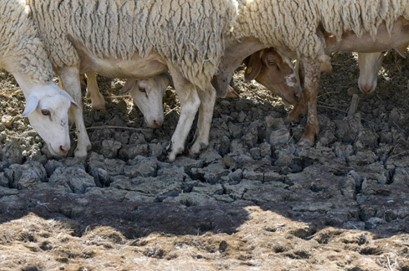
Extended Drought Parches Sicily, Farmers Worry About Livestock Sell-Offs
On a scorching July afternoon, a municipal water truck arrives in a cloud of dust at Liborio Mangiapane's farm in southern Sicily. Some of the precious liquid is transferred to a smaller cistern on a tractor that Mangiapane's son will use to fill troughs for their 250 cattle and sheep. By tomorrow, all 10,000 liters from the truck will be gone.
A crippling drought from a nearly rainless year, coupled with record-high temperatures, has devastated much of the region's hay and is pushing farmers to the brink. For Mangiapane, each day is a struggle to find water, involving frantic phone calls, long trips to distant wells, and lengthy waits for municipal tankers.
"If rain doesn't come by the end of August, I'm afraid I'll have to sell off my livestock," Mangiapane said. "We are in a moment of extreme heat, and therefore animals need a lot of water. It's a constant anxiety to keep the animals from suffering and to ensure we have enough water to wash ourselves."
Sicily has experienced its worst year for rainfall in more than two decades, leading to a 70% drop in fodder production across the island, according to Coldiretti, Italy's primary farmers' association. Major water basins are nearly empty, and authorities are strictly rationing water.
The region is one of Italy's key agricultural areas, producing 20% of the country's durum wheat used in pasta. Coldiretti estimates the drought could reduce wheat production on the island by up to 70%, increasing reliance on imports. The drought may also impact olive oil and peach production, while hot weather has prompted the grape harvest to begin nearly four weeks early, although that crop remains unaffected so far.
In May, the national government declared a state of emergency in Sicily, allocating 20 million euros ($21.7 million) for water tankers, new wells, and repairing leaky aqueducts. Coldiretti donated 1.5 million tons of fodder, and the regional government provided subsidies for farmers forced to buy hay from third parties.
Parts of Sicily have seen rainfall deficits of up to 60%, according to Italy's National Research Council. The regional meteorological service reported above-average temperatures throughout June, with highs frequently exceeding 40 degrees Celsius (104 Fahrenheit) in many areas.
Farmers have witnessed once-reliable water sources, such as basins, lakes, and ponds, vanish. Luca Cammarata, whose farm is in one of Sicily's hardest-hit areas, has seen almost no rain for a year. "Here in this small basin, water has never been lacking," he said, watching his sheep search for water in a dried-up spot. Soon, the animals would have to return to their barns to escape the blazing sun.
Nearby, Lake Pergusa, once a haven for migratory birds, has shrunk to a puddle. On Mangiapane's farm, a large pond that usually collects rainwater for his animals is now "as dry as a football pitch."
August typically marks the start of the winter rainy season. Mangiapane, a longtime rancher known for supporting natural grazing and small-scale cheese-making over industrial agriculture, hopes for better weather. "This year, we made a huge effort, both economically and in terms of human resources, with zero profits," he said. "We worked the whole year without profits. No wheat, no fodder for the cows. And neither the regional nor the national government has taken strong measures."
Local authorities have rushed to open new wells, fix desalination equipment, and bring in water. In late July, the first Italian navy tanker ship docked in Licata to supply 12 million liters (3.2 million gallons) to the most affected areas. The local water basin authority is tightly rationing water for nearly a million residents, with water flowing as little as two to four hours a week in the hardest-hit areas. While the taps are off, households and farms are being supplied by tankers, as Sicily's aqueducts lose up to 60% of the water they carry, according to local water company AICA.
As climate change makes rainfall more erratic and temperatures higher, there's hope that aqueduct renovations, new reservoirs, and deep wells will help Sicily adapt. Giulio Boccaletti, scientific director of the Euro-Mediterranean Center on Climate Change, said Sicily is experiencing "the new normal" of climate change, and the region will need to reassess how its scarce water is used, including what farmers produce.